 Earlier this week, guitar legend Eddie Van Halen died after a decade-long battle with cancer. He was often referred to as a guitar god, playing with blistering speed and bringing the tapping technique to the mainstream. One of the coolest stories I have heard about him this week was how he came to play the solo on Michael Jackson’s Beat It. Apparently, he had a deal with his bandmates that they would never do any side gigs or solo projects. However, when he was asked to perform a solo on Michael Jackson’s song, the lure of working with legendary producer Quincy Jones proved to be too much. With the rest of Van Halen out of town, Eddie decided to take on the gig, figuring no one would know he was playing the solo and figuring the song would barely be heard anyway. In all, it took him less than 30 minutes to record, and he wasn’t even paid. According to some accounts, all he asked for was a case of beer and for Michael to teach him some dance moves. As cool as the solo to Beat It is, when Jackson stepped out of the room, Eddie had the sound engineer rearrange the song, which ended up being the final version. And now on to this week’s logistics news.
Earlier this week, guitar legend Eddie Van Halen died after a decade-long battle with cancer. He was often referred to as a guitar god, playing with blistering speed and bringing the tapping technique to the mainstream. One of the coolest stories I have heard about him this week was how he came to play the solo on Michael Jackson’s Beat It. Apparently, he had a deal with his bandmates that they would never do any side gigs or solo projects. However, when he was asked to perform a solo on Michael Jackson’s song, the lure of working with legendary producer Quincy Jones proved to be too much. With the rest of Van Halen out of town, Eddie decided to take on the gig, figuring no one would know he was playing the solo and figuring the song would barely be heard anyway. In all, it took him less than 30 minutes to record, and he wasn’t even paid. According to some accounts, all he asked for was a case of beer and for Michael to teach him some dance moves. As cool as the solo to Beat It is, when Jackson stepped out of the room, Eddie had the sound engineer rearrange the song, which ended up being the final version. And now on to this week’s logistics news.
- Amazon Prime Day expected to generate nearly $10 billion in global sales
- Walmart+ quickly grows membership base
- Staples to pilot a drop-off program for easier e-commerce returns
- Surge in imports congests West Coast ports
- US trade deficit up to $67.1 billion in August
- Mars achieves deforestation-free palm oil supply chain
- Warehouse, parcel operators add thousands of jobs
- UPS faces $100M judgment for delivery of untaxed cigarettes to NYC
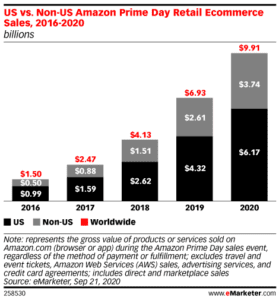 Last week I mentioned that Amazon had officially announced a date for Prime Day: October 13 – 14. Even though the annual summer sale holiday has been delayed, the timing of it lines up with an early holiday season kick-off and looks like it will be a big one for Amazon. According to eMarketer, which released its first-ever Prime Day forecast, the sales event will top last year’s and bring in an estimated nearly $10 billion in worldwide sales. To put that $10 billion in perspective, 2019 brought in $6.93 billion, 2018 brought in $4.13 billion, 2017 brought in $2.47 billion, and 2016 brought in $1.5 billion. For 2020, of the $9.91 billion in forecasted sales, $6.17 billion will come from US consumers. In August, Amazon ran its Prime Day sale in India ahead; this was later than years past but earlier than in other countries. If the results from Prime Day India are an indication of how the October will go, these numbers seem attainable. Following the India event, Amazon reported record seller participation, and said it gained at least 1 million new subscribers for its Prime membership program.
Last week I mentioned that Amazon had officially announced a date for Prime Day: October 13 – 14. Even though the annual summer sale holiday has been delayed, the timing of it lines up with an early holiday season kick-off and looks like it will be a big one for Amazon. According to eMarketer, which released its first-ever Prime Day forecast, the sales event will top last year’s and bring in an estimated nearly $10 billion in worldwide sales. To put that $10 billion in perspective, 2019 brought in $6.93 billion, 2018 brought in $4.13 billion, 2017 brought in $2.47 billion, and 2016 brought in $1.5 billion. For 2020, of the $9.91 billion in forecasted sales, $6.17 billion will come from US consumers. In August, Amazon ran its Prime Day sale in India ahead; this was later than years past but earlier than in other countries. If the results from Prime Day India are an indication of how the October will go, these numbers seem attainable. Following the India event, Amazon reported record seller participation, and said it gained at least 1 million new subscribers for its Prime membership program.
 After a few delays, Walmart+ finally launched two weeks ago. The program is Walmart’s answer to Amazon’s Prime membership program, costs $98 a year, and includes unlimited free delivery from stores, including groceries, plus gasoline discounts. The big questions surrounding Walmart+ is how much traction the retailer would get. Consumer opinion pollster Piplsay launched a survey of over 20,000 US adults between September 27 and 28. Of those surveyed, 11 percent indicated that they had already subscribed to Walmart+, with 27 percent saying they may enroll in the plan soon and 15 percent expressing no interest. The other question is how Walmart will+ impact Amazon Prime membership. According to the survey, 45 percent of Walmart+ members reported that they also belong to Amazon’s Prime customer benefits program, while 19 percent said they migrated to Walmart’s offering from Amazon Prime. For 36 percent of Walmart+ members surveyed, the signup marked their first such shopping subscription.
After a few delays, Walmart+ finally launched two weeks ago. The program is Walmart’s answer to Amazon’s Prime membership program, costs $98 a year, and includes unlimited free delivery from stores, including groceries, plus gasoline discounts. The big questions surrounding Walmart+ is how much traction the retailer would get. Consumer opinion pollster Piplsay launched a survey of over 20,000 US adults between September 27 and 28. Of those surveyed, 11 percent indicated that they had already subscribed to Walmart+, with 27 percent saying they may enroll in the plan soon and 15 percent expressing no interest. The other question is how Walmart will+ impact Amazon Prime membership. According to the survey, 45 percent of Walmart+ members reported that they also belong to Amazon’s Prime customer benefits program, while 19 percent said they migrated to Walmart’s offering from Amazon Prime. For 36 percent of Walmart+ members surveyed, the signup marked their first such shopping subscription.
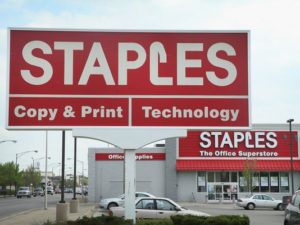 Office supply chain Staples is planning to use its stores as drop-off locations for returns of goods sold by other online brands. Staples is partnering with Optoro, a returns and reverse logistics tech firm, to enable consumers to return items to the more than 1,000 Staples stores in the US and get credit for returned items through a QR code on their phones. The plan, which will be called Express Returns, plans to launch in early 2021 to take advantage of the holiday return frenzy. For Staples, the move makes sense, as it the partnership will fit into what it calls its “service offerings,” which include in-store printing, copying, and shipping. Optoro supplies consumers with a portal for making returns and collecting refunds, and helps brands maximize the resale or reuse value of returns.
Office supply chain Staples is planning to use its stores as drop-off locations for returns of goods sold by other online brands. Staples is partnering with Optoro, a returns and reverse logistics tech firm, to enable consumers to return items to the more than 1,000 Staples stores in the US and get credit for returned items through a QR code on their phones. The plan, which will be called Express Returns, plans to launch in early 2021 to take advantage of the holiday return frenzy. For Staples, the move makes sense, as it the partnership will fit into what it calls its “service offerings,” which include in-store printing, copying, and shipping. Optoro supplies consumers with a portal for making returns and collecting refunds, and helps brands maximize the resale or reuse value of returns.
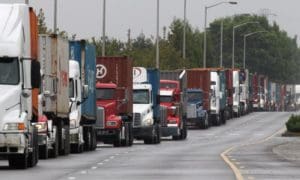 Shippers are being warned of severe congestion at the California ports of Los Angeles and Long Beach that could result in increased lead times on shipments. The congestion is mostly the result in a surge of imports over the last few months, which was driven in large part by consumer goods. Discretionary product and staple imports were up in August on stronger food and personal care shipments. Aside from the surge in imports, some of the issues are also due to vessel delays, extra loaders, chassis shortages, limitations in appointment windows, increased dwell time for local cargo, and a stretched drayage market. The ports are encouraging supply chains to use dual transactions “to improve efficiencies and ensure equipment availability.”
Shippers are being warned of severe congestion at the California ports of Los Angeles and Long Beach that could result in increased lead times on shipments. The congestion is mostly the result in a surge of imports over the last few months, which was driven in large part by consumer goods. Discretionary product and staple imports were up in August on stronger food and personal care shipments. Aside from the surge in imports, some of the issues are also due to vessel delays, extra loaders, chassis shortages, limitations in appointment windows, increased dwell time for local cargo, and a stretched drayage market. The ports are encouraging supply chains to use dual transactions “to improve efficiencies and ensure equipment availability.”
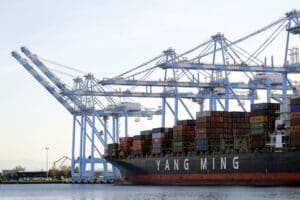 In August the US trade deficit rose to its highest level in 14 years. The Commerce Department reported Tuesday that the gap between the goods and services the United States sells and what it buys abroad climbed 5.9 percent in August to $67.1 billion, the highest since August 2006. Exports rose 2.2 percent to $171.9 billion on a surge in shipments of soybeans, but imports rose 3.2 percent to $239 billion, led by purchases of crude oil, cars, and auto parts. The US deficit with the rest of the world in the trade of goods such as airplanes and appliances set a record $83.9 billion in August. The US did run a surplus of $16.8 billion in the trade of services such as banking and education, which was the lowest since January 2012. The COVID pandemic has hit US trade hard in 2020, as the combination of import and exports is down 15.1 percent to $3.2 trillion.
In August the US trade deficit rose to its highest level in 14 years. The Commerce Department reported Tuesday that the gap between the goods and services the United States sells and what it buys abroad climbed 5.9 percent in August to $67.1 billion, the highest since August 2006. Exports rose 2.2 percent to $171.9 billion on a surge in shipments of soybeans, but imports rose 3.2 percent to $239 billion, led by purchases of crude oil, cars, and auto parts. The US deficit with the rest of the world in the trade of goods such as airplanes and appliances set a record $83.9 billion in August. The US did run a surplus of $16.8 billion in the trade of services such as banking and education, which was the lowest since January 2012. The COVID pandemic has hit US trade hard in 2020, as the combination of import and exports is down 15.1 percent to $3.2 trillion.
 Palm oil continues to be a hot topic in the news. Last week the US announced that it would block shipments of palm oil from FGV Holdings Berhad after it found indicators of forced labor, including concerns about child workers, along with other abuses such as physical and sexual violence. I have also written about a large number of companies looking to improve traceability and eliminate deforestation. This week, Mars announced that it has achieved a deforestation-free palm oil supply chain as a result of reducing its suppliers drastically under its ‘Palm Positive Plan’. Through its Palm Positive Plan, which was launched last year, Mars has simplified its supply chain by reducing the number of mills it sources from. It is awarding longer-term contracts only to suppliers who can commit to its environmental, social and ethical expectations. The progress is made possible by taking its mill count from 1,500 to fewer than 100 by 2021, and Mars says it is on the path to further halve that in 2022. With fewer suppliers, Mars claims it is easier to verify that the providers are meeting its environmental and ethical goals.
Palm oil continues to be a hot topic in the news. Last week the US announced that it would block shipments of palm oil from FGV Holdings Berhad after it found indicators of forced labor, including concerns about child workers, along with other abuses such as physical and sexual violence. I have also written about a large number of companies looking to improve traceability and eliminate deforestation. This week, Mars announced that it has achieved a deforestation-free palm oil supply chain as a result of reducing its suppliers drastically under its ‘Palm Positive Plan’. Through its Palm Positive Plan, which was launched last year, Mars has simplified its supply chain by reducing the number of mills it sources from. It is awarding longer-term contracts only to suppliers who can commit to its environmental, social and ethical expectations. The progress is made possible by taking its mill count from 1,500 to fewer than 100 by 2021, and Mars says it is on the path to further halve that in 2022. With fewer suppliers, Mars claims it is easier to verify that the providers are meeting its environmental and ethical goals.
As the holiday season rapidly approaches, companies are adding tens of thousands of temporary employees in anticipation of the e-commerce surge that is likely coming. The COVID pandemic has propelled e-commerce to unanticipated heights, and it is showing no signs of slowing down. As consumers continue to be cautious of spending time in malls, online shopping is sure to lead the charge for the 2020 holiday season. According to seasonally adjusted preliminary employment figures released by the US Bureau of Labor Statistics, warehousing and storage payrolls jumped by 32,200 jobs in September. The jump in a sector that includes online fulfillment centers followed an addition of 34,400 jobs in August and came as retailers and logistics operators say they are planning on large-scale seasonal hiring for 2020. Courier and messenger companies that deliver packages to homes and businesses added 10,300 jobs in September, and trucking companies added 4,600 positions. I will have a full forecast on seasonal hiring in the coming months.
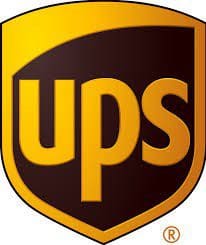 UPS is on the hook for a $100 million judgement. Earlier this week, the US Supreme Court denied a petition from UPS to reconsider the hefty penalty for delivering untaxed cigarettes in New York City. The decision by the high court means the delivery company must pay up. A 2014 study concluded that 60% of cigarettes in New York were subject to tax evasion, resulting in an estimated loss of tax revenue exceeding $2 billion annually. UPS said in a statement that it had greatly improved its ability to prevent shipments of untaxed smokes. The city and state sued UPS the following year. According to city Corporation Counsel James Johnson:
UPS is on the hook for a $100 million judgement. Earlier this week, the US Supreme Court denied a petition from UPS to reconsider the hefty penalty for delivering untaxed cigarettes in New York City. The decision by the high court means the delivery company must pay up. A 2014 study concluded that 60% of cigarettes in New York were subject to tax evasion, resulting in an estimated loss of tax revenue exceeding $2 billion annually. UPS said in a statement that it had greatly improved its ability to prevent shipments of untaxed smokes. The city and state sued UPS the following year. According to city Corporation Counsel James Johnson:
“Companies that illegally ship untaxed cigarettes into our city undercut our public health laws and deny the City millions in needed tax revenues. We have not finished our work here. Violators should consider themselves on notice that there is more to come.”
That’s all for this week. Enjoy the weekend and the song of the week, Eruption by Van Halen.

















